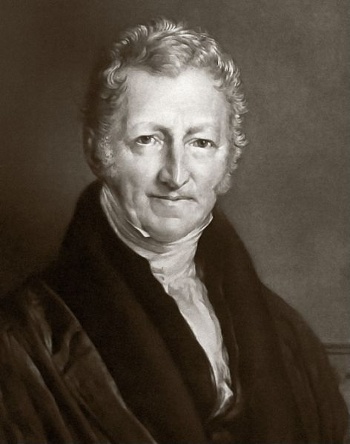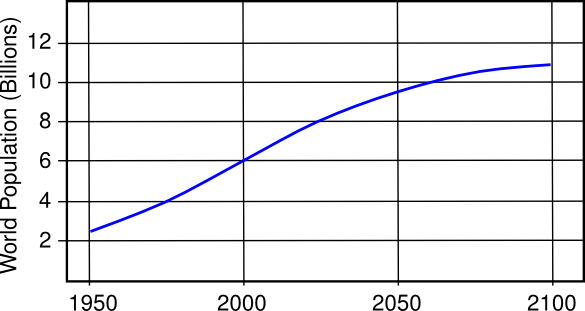World Population
October 3, 2014
My location in the
suburbs of
Northern New Jersey is interesting in one respect. When I travel
east from my house, towards
New York City, just forty
miles distant, I see more and more people. Traveling in the other direction, towards
Pennsylvania, thirty miles away, I see fewer and fewer people. People living east of me might feel that the world is
overpopulated, but people living
west of me revel in their relative isolation.
The
world's population now stands at a little more than seven billion. I'm a
baby boomer, born a few years after
World War II, which was not that long ago (after all, sixty-five is the "new" fifty-five, isn't it?). At that time, the world population was just 2.5 billion. That's quite a change in such a short time.
The world population has grown continuously from the late
Middle Ages to the present. Since humans need
natural resources to survive, and the
Earth is a limited space,
economists have wondered for
centuries whether any limit might be reached. Two centuries ago,
Thomas Robert Malthus (1766-1834) wrote a seminal
treatise on the topic,
An Essay on the Principle of Population (1798).[1]

Thomas Robert Malthus (1766-1834)
Malthus published his 1798 treatise, "An Essay on the Principle of Population," under the pseudonym, Joseph Johnson.
Malthus' use of a pseudonym is understandable, as we can see the controversy that his ideas engender even today.[2]
(An 1833 portrait by John Linnell (1792-1882), via Wikimedia Commons.)
The Malthusian theory of population is similar to the idea of
negative feedback in
electrical engineering. Malthus argued that human population will expand until it's distressed by limited resources. A
corollary to this is that we will always have people living at a
poverty level. Malthus reasoned that population growth is necessarily
exponential, doubling over a certain period, while the
production of food scales
arithmetically, increasing by a fixed factor over that same period.
Mathematically, population will always overtake resources.
Exponential population growth is
reasonable, although the doubling period can change, but Malthus' arithmetic argument isn't that clear. Some have argued that the simplified mathematics with which Malthus was familiar lumped
series expansions into just two categories,
geometric, and non-geometric, the later exemplified as
arithmetic. In any case, it was clear to Malthus that food production would always expand at a lesser rate than population. While people will always make more people, a
corn field can't make another corn field when all
arable land has been used.
While Malthus had a good handle on population up to his time,
technology has thrown a new
variable into the mix.
Advanced farming techniques, exemplified by the
Green Revolution of the past fifty years in which
irrigation,
chemical fertilizers,
pesticides, and
high-yield cereal grains, have substantially increased world food supply. Seven billion people could not survive with the
agriculture of Malthus' time, but they can today.
Owing to this idea of exponentiality and the success of technology in (mostly) feeding a population increasing substantially each year, there have been some wild, recent
estimates of what the future population might be. To quote from a 2003
United Nations report, "If the
fertility of major areas is kept constant at 1995 levels, the world population soars to 256 billion by 2150..."[3] It would be obvious to most that Malthusian limits will kick in way before the population reaches 256 billion.
The
quotation, "It's tough to make predictions, especially about the future," has been attributed to both
Yogi Berra and
Niels Bohr,[4] but such predictions are easier when the future is just a few years away, and you have help from some
mathematical models. A recent
analysis of population trend was done by an international team from the United Nations (New York, New York, and other locations) the
University of Washington (Seattle, Washington), the
National University of Singapore (Singapore), and
Colorado State University (Fort Collins, Colorado). Although a current estimate predicts that the world population will peak at nine billion people and remain stable after 2050, this new estimate is that the population will continue to grow, reaching 9.6 billion to 12.3 billion by 2100 (see figure).[5-9]

Historical data, and the United Nations population estimate. The line shows the middle of the estimate range. (Graphic by author, rendered using Inkscape.)
To arrive at this estimate, which has a much smaller range of
uncertainty than previous estimates, the
research team subjected
data collected through 2012 to a
Bayesian probabilistic methodology.[6] The
fine-grained data considered population and fertility rate on a
country-by-country basis.[6] After cranking through the numbers, it was found that there's a 95%
chance that the world's population will be in the range 9-13.2 billion by the year 2100.[6]
Africa will account for a considerable fraction of the population gain, growing from one to a likely four billion by 2100.[6] The African trend comes from a combination of high
birth rate and a
death rate lower than previous estimates. Africa has not followed the trend towards smaller
family size shown in the rest of the world.[8] African women are still having an average of six
children, and advances in
HIV/AIDS treatment have helped to manage this once fearsome
plague on that
continent.[9] The African population might even reach 5.1-5.7 billion by 2100.[8]
Nigeria might have a population of 900 million by 2100, up from its 200 million of today.[7]
Malthus, however, might be lurking in shadows.
Climate change is expected to put stress on agricultural production, and there are possibilities, also, of
wars and
disease.[9]
John Bongaarts,
Vice President and
Distinguished Scholar at the
Population Council, is quoted in
Science as saying, "It could very well be that we could have
epidemics, or wars, or unrest that creates massive mortality. But to be honest, it would require something of a huge magnitude to alter this trajectory."[6]
Aside from the
logistics of feeding such a large number of people, there's also the secondary problem of their
age distribution. Worldwide, the
ratio of
working-age people to older people will decline substantially.[5] By way of example,
Brazil now has 8.6 working-age people for every person over 65, but the ratio is expected to fall to 1.5 by the year 2100.[7]
One proposed solution to overpopulation involves
education, but not merely education on
contraception. In general, educated women have fewer children than uneducated women. Using
Ghana as an example, uneducated women have an average of 5.6 children, while women with
secondary education have 3.2.
College-educated women have an average of only 1.5 children.[7]

Humans have survived as a species because everybody loves babies.
Sleeping Child, oil painting by Bernardo Strozzi (1581-1644).
(Via Wikimedia Commons.)
![]()
References:
- T. R. Malthus, "An Essay on the Principle of Population," (J. Johnson, London), 1798 (via Project Gutenberg)
- Paul Krugman, "The Malthusian insult," New York Times Blogs, July 1, 2009.
- Key Findings: Long-Range Population Projections, Proceedings of the United Nations Technical Working Group on Long-Range Population Projections (New York: United Nations: Department of Economic and Social Affairs), 2003 (PDF file)
- Letters: The perils of prediction, The Economist, July 15, 2007.
- Patrick Gerland, Adrian E. Raftery, Hana Ševčíková, Nan Li, Danan Gu, Thomas Spoorenberg, Leontine Alkema, Bailey K. Fosdick, Jennifer Chunn, Nevena Lalic, Guiomar Bay, Thomas Buettner, Gerhard K. Heilig, and John Wilmoth, "World population stabilization unlikely this century," Science, Early Online Publication (September 18, 2014), DOI: 10.1126/science.1257469.
- Sarah C. P. Williams, "Experts be damned: World population will continue to rise," Science Magazine, September 18, 2014.
- Damian Carrington, "World population to hit 11bn in 2100 – with 70% chance of continuous rise," The Guardian, September 18, 2014.
- Jessica Berman, "Global Population Predicted to Reach Nearly 11 Billion by 2100," VOA News, September 18, 2014.
- David Talbot, "U.N. Predicts New Global Population Boom," Technology Review, September 18, 2014.
Permanent Link to this article
Linked Keywords: Suburb; Northern New Jersey; east; Manhattan; New York City; mile; Pennsylvania; overpopulation; overpopulated; west; world population; baby boomer; World War II; Middle Ages; natural resource; Earth; economist; century; centuries; Thomas Robert Malthus (1766-1834); treatise; An Essay on the Principle of Population (1798); pseudonym; controversy; John Linnell (1792-1882); Wikimedia Commons; negative feedback; electrical engineering; corollary; poverty threshold; poverty level; exponential function; production of food; arithmetic progression; arithmetical; mathematics; mathematical; logical consequence; reasonable; series expansion; geometric progression; maize; corn field; arable land; technology; variable; modern agriculture; Advanced farming techniques; Green Revolution; irrigation; chemical fertilizer; pesticide; crop yield; cereal grain; agriculture; approximation; estimate; United Nations; fertility; quotation; Yogi Berra; Niels Bohr; mathematical model; analysis; University of Washington (Seattle, Washington); National University of Singapore (Singapore); Colorado State University (Fort Collins, Colorado); Inkscape; uncertainty; research; data; Bayesian probability; Bayesian probabilistic methodology; granularity; fine-grained; country; probability; chance; Africa; birth rate; mortality rate; death rate; family size; child; children; HIV/AIDS; therapy; treatment; plague; continent; Nigeria; climate change; war; disease; John Bongaarts; Vice President; Distinguished Scholar; Population Council; Science; epidemic; logistics; population pyramid; age distribution; ratio; workforce; working-age; Brazil; education; birth control; contraception; Ghana; secondary education; college-educated; human; species; infant; baby; Bernardo Strozzi (1581-1644); T. R. Malthus, "An Essay on the Principle of Population," (J. Johnson, London), 1798.